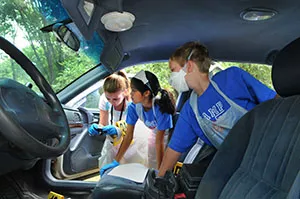
Crime scene campers learn investigation techniques
When 10-year-old Ryan snapped on his blue latex gloves and ducked under the police tape, he discovered the scene of a robbery: a laptop, wallet, television and jar full of Mrs. Baker’s home-made cookies had been stolen in broad daylight.
Ryan, and 18 other junior sleuths, tried to piece together what happened as part of their activities at U of T Mississauga’s forensic science summer camp.
“I took notes about things we saw inside the house and outside on the property,” Ryan says. Other campers photographed the crime scene, dusted for fingerprints, cast footwear impressions, and bagged and tagged evidence for analysis back at the lab in the Davis Building.
Launched in 2007 as part of the Camp U of T program, the forensics camp attracts children ages nine to 13 who want to learn the ropes of crime scene investigation.
Professor Tracy Rogers, a forensic anthropologist and director of U of T Mississauga’s forensic science program, designed the camp to offer a five-day exploration of an age-appropriate crime mystery. The week-long basic or advanced-level sessions run for the month of July.
“Forensic science appeals to younger children because it has elements of ‘good guy’ versus ‘bad guy’. For older kids, the puzzle-like quality of forensics is attractive,” Rogers says. “The highlight of the week is the visit to the crime scene house on campus, which adds a dimension of realism to the case they’re working on.”
While the dynamic program—where campers identify mysterious powders, determine blood types and analyze hair and fibre samples—gets kids ‘psyched’ about science, Rogers says it also teaches that forensics requires discipline, patience and backing up a theory with cold, hard evidence.
“The kids learn that you don’t stick something under a microscope, have the answer pop up and you’re done—like it’s shown on television.”
At the end of the week, campers present their theories on which suspect stole Mrs. Baker’s cookies. Though opinions often differ about the thief’s identity, the campers all agree that the program’s gadgets and hands-on investigations let them step into the shoes of a real forensic scientist.
